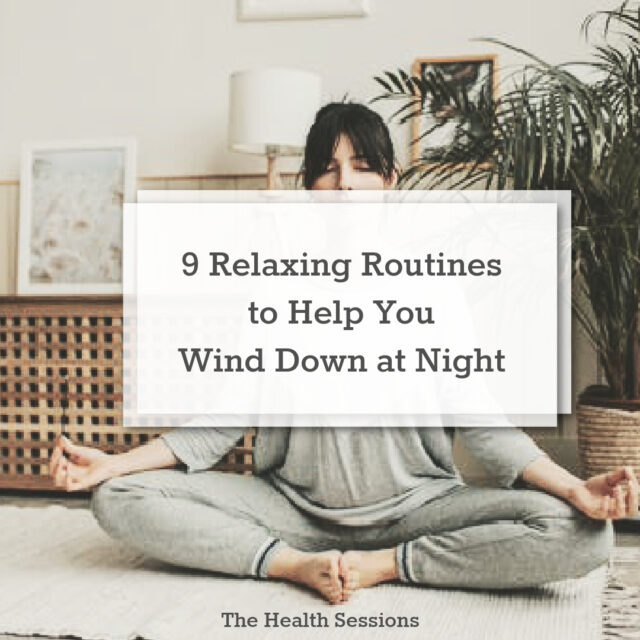Winter Wellness: 15 Natural Remedies and DIY Beauty Recipes

This blog post contains some affiliate links to products you may find useful, at no extra costs to you. All opinions are my own.
Are you one of those people who falls asleep the minute their head hits the pillow? Yeah, me neither.
And that’s not so strange if you think of it. All day long, your mind is bombarded with information, from the conversations you’re having and the work you’re doing to daily news updates, email, text messages, social media notifications and even the background music playing. Your brain needs time to process all these stimuli, filter out the most important pieces and store them in your longterm memory. No wonder thoughts keep running through your mind when you’re lying in bed at night, finally in solitude and stillness.
That’s why having relaxing routines to wind down at night can be so helpful in getting adequate sleep and rest, lowering stress levels that hurt your health and reduce anxiety and rumination.
Activities like taking a warm bath, drinking chamomile tea or doing gentle yoga don’t just relax your body, but routines you perform regularly also signal to your brain it’s time to prepare for sleep. So give yourself a bedtime and start winding down at least 1 hour beforehand.
Take inspiration from these 9 relaxing routines on how to release tension from your body, quiet your mind and set the scene for slowly drifting off to sleep.

Light is the most important cue for your brain to regulate your body clock – the internal 24-hour schedule that runs your sleep-wake cycle, hormone production and mental alertness. In nature, your body clock would be guided by sunrise and sunset. But our modern world filled with artificial light and flickering screens can give your brain the wrong message.
Exposing yourself to bright light at night can disturb your internal clock, making you alert rather than sleepy. Research shows that even street lights peaking in can mess up your quality of sleep. What’s more, blue light coming from the screens of your cell phone, tablet and television suppresses the release of melatonin, the sleeping hormone.
So when you’re winding down before bed, turn the lights in your home down low. You could light a candle for ambience or go all-in by choosing red light bulbs to simulate sunset. The Philips SmartSleep Wake-Up Light even doubles as a red-tinted bedside reading lamp and a unique ‘alarm clock’ that wakes you up with a combination of light and natural sounds.
Overall, try to keep your bedroom dark by hanging black-out curtains and removing electronic devices. If you do use your phone or tablet close to bedtime, put your screens on night mode and consider getting blue-light blocking glasses to reduce their impact on your sleep.
Kicking off your shoes and changing into a comfy outfit is a common start of a relaxing evening routine. After all, there’s no easier way to let your body and brain know that it’s time to start winding down than putting on loungewear, fluffy socks or cozy slippers. Choose soft fabrics and a loose fit for maximum results.
Staying warm while it slowly gets cooler around you is a good recipe for sleep. So curl up under a beautiful blanket with a warm drink when you start to wind down at night.
If you have trouble falling asleep at night, having coffee, hot chocolate or other caffeinated drinks after dinner is a no-go. Caffeine stays in your system for 5 to 6 hours after ingestion and therefore disturbs your sleep when consumed at night.
Herbal teas, on the other hand, make a great bedtime drink. Especially chamomile and valerian root are known to promote relaxation and good sleep. And there’s also truth in the time-honored advice to drink warm milk for a restful night. Research shows that milk contains tryptophan and peptides that support falling asleep easily and sleeping throughout the night.
You could also swap your chocolate bar for more sleep-inducing snacks. Bananas, almonds and pumpkin seeds are good sources of magnesium, a mineral that supports muscle relaxation, and tryptophan, an amino acid necessary for the production of melatonin. Melatonin itself can also be found in walnuts and tart cherry juice.
Smart snacking at least one hour for bedtime can be a helpful part of a relaxing routine and promote better sleep.

What’s more relaxing after a tiring day than taking a warm bath? And that’s no coincidence. Research shows that bathing or showering in warm water (around 104F or 39C) 1 to 2 hours before bedtime will help you fall asleep faster. Not only because a warm bath relaxes your body, but it also stimulates your blood circulation and consequently lowers your body core temperature.
You can turn your tub time into an even more relaxing routine by adding some natural ingredients. For example, Epsom salt supports muscle recovery, whereas lavender essential oil is known to improve your sleep. Just make sure you dilute essential oils properly in soap or carrier oils before adding them to your filled bath.
Don’t have a bath or too exhausted for pampering at night? Using a heatable cherry pillow or hot water bottle will also relax your muscles and get you comfortably warm.
It’s no secret that moderate exercise done regularly can improve both the length and the quality of your sleep. But working out will raise your body temperature and trigger the release of endorphins, which both can keep you up at night if you exercise close to bedtime.
So instead of doing intense movement that gets your heart rate up, try some mind-body practices to wind down. Studies suggest that practicing Tai Chi or yoga before bed can help you fall asleep. Focus on gentle stretching and slow breathing to release tension from your body and calm your mind. You could do these 15 relaxing yoga poses, try this easy Tai Chi routine or simply put you legs up against the wall and lie down in Savasana.
Too ill to get moving, no matter how gently? You can still let go of tension in your body by practicing progressive muscle relaxation – a technique that involves alternating tensing and relaxing all of your major muscle groups.
In short, find a quiet place to lie down. One by one, you squeeze your feet and legs, bottom, arms and hands, neck, shoulders and facial muscles for 15 seconds, while the rest of your body remains relaxed. Then, you slowly let go all the tension from that area as you exhale.
This combination of muscle relaxation, deep breathing and mindful body scan triggers your body’s relaxation response – the best antidote to stress and a natural sleeping aid.

Yes, it may sound boring, but unplugging one hour before bedtime can really help you to get a better night’s sleep. It’s not just that the blue light coming from electronic screens messes with your ability to fall asleep, but it’s also hard to wind down and switch your mind off when you get constant notifications from email, social media and news outlets.
So put your phone on airplane mode when it’s time to start winding down. Swap some of your screen time for more analogue hobbies like reading, making a jig saw puzzle, playing board games or simply cuddling with your partner or pet. If your mind gets bored easily, you could listen to audiobooks while you’re coloring, scrapbooking or getting ready for bed.
Can’t stop the thoughts racing through your mind while you should be getting to sleep? According to a study from Baylor University, offloading your worries and mental notes onto paper can reduce overthinking at night, and thus help you fall asleep faster.
There are several ways you can write down your thoughts to reduce lying awake at night worrying. For some, simply jotting down your to-do’s or diary-style journaling will do, while others benefit most from specific self-reflection or keeping a gratitude journal. Whatever style you prefer, get yourself a beautiful journal and start trusting your thoughts to paper as part of your relaxing routine.
Two powerful ways to calm your mind and transition your body to rest-and-recovery mode before bed are (guided) mediation and visualization. By focusing on your breathing, a mantra and/or soothing scenarios, you quiet your racing thoughts and activate your natural relaxation response.
Winding down with a mediation can be a simple as closing your eyes and directing our attention to your breathing. Observe wandering thoughts without judgement, before you bring your focus back to your breathing. If you’re more into visualization, you could also vividly picture relaxing scenes, like walking on the beach, to get you in the mood for sleep.
If your mind keeps drifting off during mediation or visualization, the Flowly app comes to your rescue. This patented tool engages you in Virtual Reality environments designed for deep relaxation. Through a combination of breathing guides, voice-over and biofeedback, Flowly helps you to regulate your own nervous system and as a result reduce pain, anxiety and sleeping problems.

If you’re curious if these relaxing routines really improve your sleep over time, you could use these sleep trackers (at the bottom of the article) to monitor your progress.
I’d love to know, do you have any relaxing routines to wind down at night? What helps you the most to ensure a good night’s sleep?
If you enjoyed reading this article, you might also like: